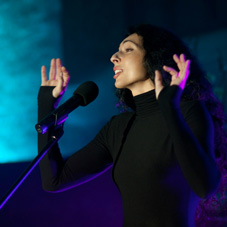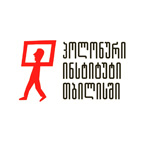
Polish-Jewish Culture Days in Tbilisi
By Anita Magradze
Wednesday, May 15
Within the frames of European days in Georgia, on behalf of the Embassy of the Republic of Poland in Tbilisi, Polish Institute in Tbilisi and the Jewish Historical Institute in Warsaw, Georgians are invited to get acquainted with the culture of Polish jews.
On May 14 famous singer Nina Stiller performed a new program 'Jiddishe Pearl,' offering the audience a completely new version of the traditional Jewish songs of Polish Jews at the Royal District Theater.
The concert will open Jewish Culture Days, during which Tbilisi residents will be able to get to know a small part of the rich culture of Polish and Yiddish languages.
Yiddish is the language of European Jews and European culture. Before World War II, the language was spoken by several million citizens of the Polish Republic. In Warsaw, more than 300,000 people used to speak it. Yiddish was almost completely destroyed during WW2 as a result of Nazi Germany's ruthless policy.
In spite of the tragic events, the language has survived. The number of people interested in Yiddish culture, as well as groups of researchers who are studying the traditions of this language, is increasing all over the world. In Warsaw, the Jewish Theater is making plays in Yiddish, in 2006 Polish-Yiddish word dictionary was published. The newspaper "Slowo Zydowskie" is published regularly, and young people study in Yiddish universities.
"I am very glad that Georgian society has the opportunity to become acquainted with even a very small part of the Polish-Jewish culture," stated the Ambassador of Poland to Georgia, Mariusz Maszkiewicz.
Polish-Jewish culture - stated the Ambassador of Poland to Georgia, Mariusz Maszkiewicz.
On May 15, the National Parliamentary Library of Georgia will be holding a meeting with the Director of the Institute of Jewish History, Professor Pavel Spievaev about Polish-Jewish Culture.
On May 16 and 18, the treasures of cinematography, films directed in the Yiddish language in Warsaw before WW2, will be presented at Amirani cinema. The concept of Yiddish cinema covers those films that were created by Jewish filmmakers (though exceptions from this rule exist) and reflected themes and issues related to the Jewish diaspora. These types of products were mainly created in the areas inhabited by large Jewish communities having rich cultural potential.
At the end of the festival, on May 19, Tango evening will be held in Tumanishvili theatre. Jewish composers of Warsaw are known for their compositions in Tango style. Small Dance Orchestra led by Noam Zylberberg, aims to revive Warsaw’s musical life in between war periods. The orchestra performs and arranges the songs the way it was conceived by the composers when creating them.


